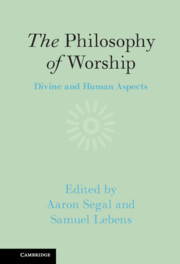Book contents
- The Philosophy of Worship
- The Philosophy of Worship
- Copyright page
- Contents
- Contributors
- Part I Two Introductions
- Part II What Is Worship?
- Part III Normative Aspects
- 7 Monotheism, Worship, and the Good
- 8 Can I Both Blame and Worship God?
- 9 Worship, Excellence, and Intrinsic Value
- 10 What’s Wrong with Idolatry, and Why There Is No Excuse
- 11 Owing God Worship
- 12 Worship for Atheists
- Part IV Forms and Functions of Worship
- Index
- References
11 - Owing God Worship
from Part III - Normative Aspects
Published online by Cambridge University Press: 09 January 2025
- The Philosophy of Worship
- The Philosophy of Worship
- Copyright page
- Contents
- Contributors
- Part I Two Introductions
- Part II What Is Worship?
- Part III Normative Aspects
- 7 Monotheism, Worship, and the Good
- 8 Can I Both Blame and Worship God?
- 9 Worship, Excellence, and Intrinsic Value
- 10 What’s Wrong with Idolatry, and Why There Is No Excuse
- 11 Owing God Worship
- 12 Worship for Atheists
- Part IV Forms and Functions of Worship
- Index
- References
Summary
We have little basis to doubt (a) that we have good reasons to worship God, (b) that God is worthy of worship, (c) that worship of God is reasonable, (d) that it is unreasonable not to worship God, and (e) that worshipping God is obligatory. But none of these normative states of affairs amounts to or entails our owing God worship. The central aim of this chapter is to show that we do not by nature owe God worship; our owing God worship could be no more than a contingent matter. That our owing God worship is contingent does not entail or even suggest that there is any imperfection or limitation in God, and there are good reasons to hold that it is an attractive view of the relationship between God and humans that our owing God worship is a matter of a special contingent relationship between God and us rather than something that holds by nature.
- Type
- Chapter
- Information
- The Philosophy of WorshipDivine and Human Aspects, pp. 189 - 208Publisher: Cambridge University PressPrint publication year: 2025

